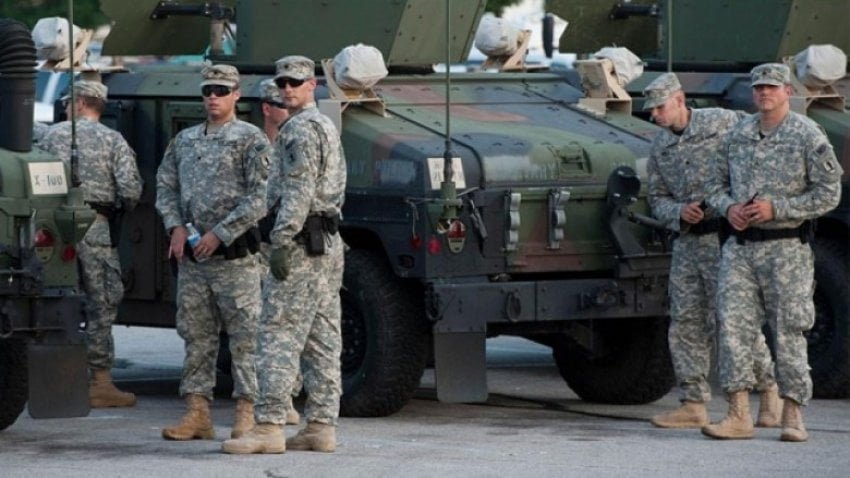The mandate of KFOR in Kosovo is for peacekeeping. And that’s what they’ve been doing since 1999.
The most tense situation is in the northern part of Kosovo, where there are more military troops.
Professor Muahmet Kelmendi has said that KFOR in Kosovo is responsible for full security.
According to him, there are over 5,000 KFOR troops in Kosovo, mainly stationed in the north, where tensions still remain.
“Kosovo has been under NATO control since 1999. That’s when KFOR was deployed by NATO. Now, there are about 5,000 NATO soldiers in Kosovo. They are mainly stationed in the north, in four municipalities inhabited by Serbian majority. It was precisely here, on September 24, 2023, that a Serbian terrorist aggression took place, aiming to divide this part of Kosovo from the Republic and join those municipalities with ‘Mother Serbia’, based on the realization of the ‘Serbian world’. NATO’s presence in Kosovo made it possible to ensure relative peace in the Republic and thus in the region.
NATO also influenced the construction of a Kosovo army according to NATO principles. Thus, the Kosovo Security Force (KSF) was established, which has now reached a similar capacity to NATO member states. NATO, with its forces stationed in Kosovo, also did a great job in maintaining peace and stability in the Western Balkans,” he said.
He further elevates the values and work of KFOR, stating that they prevented Serbian world marches by joining their forces with KLA actions to prevent Serbia.
“KFOR significantly influenced and prevented Serbian world marches in this part of the Balkans. With NATO inside, peace and equality were also preserved in Kosovo. NATO joined the bombing actions with the KLA and Kosovo was liberated.
This unity became a barrier and a guarantor of freedoms and human and national rights in Kosovo and beyond, in the Balkans. KFOR also influenced the construction of the country. Bridges and roads were built. Many economic and social facilities were erected in Kosovo.
Immediately after the terrorist action in Banjskë, Kosovo, on September 24, 2023, by deploying its military forces in the north, it stopped the Serbian terrorist march, with the ideology of the ‘Serbian world’. With KFOR inside Kosovo, the Republic also prepared for Euro-Atlantic integrations,” Kelmendi emphasizes.
Regarding the Kosovo army, he says that KFOR closely collaborates to make the KSF a professional army.
However, he adds that Kosovo must also work hard to join the Council of Europe, the EU, NATO – thus not holding back from allied countries.
“NATO influenced the enhancement of military capabilities. It closely collaborates with the KSF. A professional army was built, based on the national and political rights and freedoms of all. With NATO’s work, as well as in cooperation with EULEX, the US, England, Germany, Italy, Turkey, and KFOR, the country was prepared for integrations into the Council of Europe, the EU, and especially NATO. There are no more political or military obstacles for Kosovo not to become a member of NATO. Only time is expected.
Of course, in this direction, Kosovo also needs to make much more effective policies with the US, England, France, Germany, Italy, Turkey, etc., towards integrating the KSF into NATO. The more participation the KSF has in NATO activities, the more it influences the states for Kosovo to join this peacekeeping military force of Western democracies. Kosovo is also required to participate in NATO’s peacekeeping actions.
One should not wait for requests to come from outside to participate in NATO’s actions, but Kosovo is required to express and demand participation of its forces (KSF) in NATO. The example of KSF participation in Kuwait with the US should be welcomed. KSF is required to be everywhere alongside NATO. To exercise with the soldiers of this force and to accept all positions and sanctions. The policy needs to be active and explanatory. Kosovo currently has a rigid position, which is not yielding results. It’s an unproductive policy and is showing incredibility towards the EU, states, and NATO. The notion that Kosovo is a center of peace in the Balkans and in Europe damages Kosovo’s position a lot. Rigidity is damaging. Without an aggressive policy in terms of clarifying the situation in the country and the interest of integration into NATO, there is no positivity towards membership in the CoE, the EU, and NATO,” he concludes.







